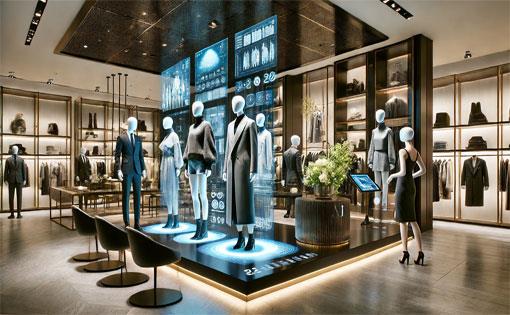Artificial Intelligence (AI) is transforming industries, and the luxury fashion industry is no exception. AI is now more present than ever, revolutionising design processes, enhancing sustainability, and improving customer experiences. By leveraging AI tools such as generative design platforms, brands can create innovative designs quickly and efficiently. AI-driven solutions are also helping brands like Stella McCartney and Burberry optimise supply chains and implement virtual try-ons, enhancing both sustainability and customer satisfaction. As AI continues to evolve, its integration into fashion is set to deepen, offering even more sophisticated applications. Here are some points on how AI is being leveraged by luxury fashion brands and designers in 2024:
1. Enhancing Creativity and Design
AI is becoming a crucial tool for fashion designers, enabling them to explore new creative avenues and streamline the design process. Tools like Midjourney and Stable Diffusion allow designers to generate multiple design variations without the need for costly physical samples. From AI Fashion Week 2023 by Maison Meta to Casablanca’s AI-generated campaign collection for SS23, the fashion industry has been one of the most explorative with the technology. AI also supports the ideation process by analysing past collections and suggesting new designs. For instance, Collina Strada used AI to support the ideation for its Spring/Summer 2024 collection, integrating AI-generated designs with traditional methods to create unique pieces.
Similarly, back in 2022 in Hong Kong, Professor Calvin Wong developed the world’s first designer-led AI system named “AI-based Interactive Design Assistant for Fashion” (AiDA), which has the capability to generate blueprints from initial sketches and colour schemes. Tools like Google’s DeepDream and IBM’s Watson have been used by designers to create innovative patterns and fabrics. Indian fashion designers like Gaurav Gupta and Falguni & Shane Peacock have also embraced IBM’s Watson for cognitive designing and mapping of fashion shows and themes from across history.
2. Sustainability Initiatives
The fashion sector significantly contributes to water wastage, greenhouse gas emissions, and non-compostable waste, increasing landfills year after year. Given this scenario, AI is playing a significant role in promoting sustainability within the fashion industry. By optimising supply chains and reducing waste, AI helps brands minimise their environmental impact. For example, Stella McCartney partnered with Google Cloud to use machine learning for supply chain transparency, reducing water usage and carbon emissions. This facilitates supply chain transparency and helps in making more conscious sourcing decisions.
3. Virtual Try-Ons and Augmented Reality (AR)
Luxury brands are using AI-powered virtual try-ons and AR to enhance the online shopping experience. Burberry and Google Shopping have implemented AR tools that allow customers to virtually try on clothes and accessories, addressing issues related to sizing and fit. This technology not only improves customer satisfaction but also reduces return rates, which is beneficial for both the environment and the bottom line. The Indian designer duo Falguni & Shane Peacock is among the first in India to launch an interactive online shoppable video, allowing consumers to take a closer look at a product worn by a celebrity and help put together a look specifically for them, where all the products can be purchased online.
Similarly, Virtual Reality (VR) in AI can simulate private fashion shows, personalised shopping tours, and bespoke fittings. For instance, Dior offers virtual store tours that provide a unique and interactive shopping experience from the comfort of one’s home.
4. Trend Forecasting and Customer Insights
Historically, fashion forecasters and trendsetters relied on qualitative methods such as observing runway shows, street fashion, fashion influencers, and pop culture to predict trends, sometimes even considering the influence of geopolitics and the culture of a particular country on the world. Today, AI tools analyse vast datasets from social media, search engines, fashion shows, global influences, and sales to predict fashion trends accurately. Platforms like Trendalytics and Heuritech use AI to provide insights into emerging trends by extracting data from social media and Google, helping brands stay ahead of the curve. Tommy Hilfiger’s ‘Reimagine Retail’ project utilises AI to streamline the design process and align it with current market demands.
5. Personalised Marketing and Customer Service
AI-driven personalisation is transforming how luxury brands engage with their customers. Generative AI can create personalised marketing content, tailored to resonate with individual customers. Brands like Gucci and Valentino are leveraging AI to enhance customer interactions and provide bespoke shopping experiences. AI-powered chatbots and virtual assistants improve customer service by offering instant, personalised responses, which is especially valuable for high-end clients who expect premium service. Similarly, AI-powered chatbots and virtual assistants offer 24/7 customer support, providing immediate and personalised responses. Brands like Louis Vuitton and Cartier have implemented AI-driven customer service solutions to enhance the shopping experience and ensure customer satisfaction.
6. Anti-Counterfeiting Measures
AI helps luxury brands protect their intellectual property and combat counterfeiting. By analysing patterns and detecting anomalies, AI systems can identify counterfeit products and prevent them from entering the market. This technology ensures that customers receive authentic products, thereby maintaining the brand’s reputation and customer trust. For instance, Gucci and LVMH have implemented AI systems to ensure the authenticity of their products. These AI tools can scan and verify the unique characteristics of items, such as stitching patterns, logos, and fabric details, to differentiate between genuine and counterfeit goods. By using AI, these brands can efficiently monitor their supply chains and marketplaces, ensuring that only authentic products reach consumers, thereby preserving their brand integrity and customer trust.
Conclusion
AI is significantly transforming the luxury fashion industry by driving innovation, enhancing customer experiences, promoting sustainability, and protecting brand integrity. As technology continues to evolve, its integration into fashion is set to deepen, offering even more sophisticated and impactful applications in the near future.

